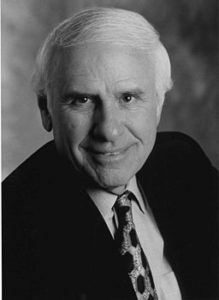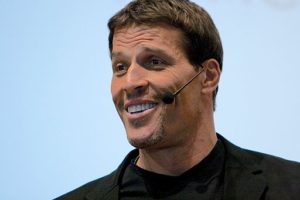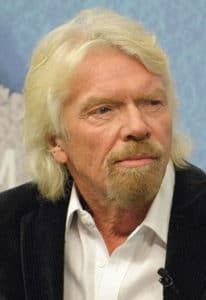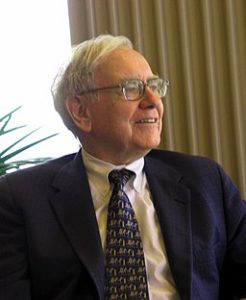Most of what I know about money and entrepreneurship I owe to those people that have already achieved great success in those fields. These are the people that have gone through plenty of hardship and struggles, but never gave up and were able to achieve things for what we know them today. Fortunately, they were also gracious enough to share their valuable lessons and experiences with the rest of the world. Today, we often refer to these individuals as business motivators.
The lessons described below were taken from various books and videos. Some things mentioned are direct quotes, while others are a combination of ideas and theories that were put together and paraphrased by me. I hope they inspire you just as much as they inspire me!
Dean Graziosi
Bigger problems
The first business motivator in the list, Dean Graziosi, explains that we’ve been told to believe that if we find the right opportunities and work really hard, we can be successful. That’s simply not true, he adds. Millionaires, billionaires and successful people in general, have realized that you need the foundation for wealth – the habits.
Dean also often talks about how successful people do not have the problems that so many of us are used to. They don’t care about bad weather, somebody flicking them off in the middle of the driveway or whether somebody likes them or not. No, they don’t care about any of that because they understand that every day has a limited amount of hours for you to solve REAL problems. In fact, successful people want bigger problems because those are the problems that replace the small pointless problems and take you further ahead towards accomplishing your goals.
By not caring about the small things, and instead taking care of the bigger things, you achieve success and create more room for even bigger problems to solve. That is how growth happens. The small problems never go anywhere, Dean says. It’s just that you need to solve bigger problems to become successful and make every day count.
Click To TweetDon’t count the days. Make the days count. – Muhammad Ali
Jack Canfield

Don’t be afraid to ask for help
Jack Canfield is one of the most famous business motivators in the world. One of his strongest beliefs is that success in life is a team sport. What this means is that it is very important to surround yourself with people that are just as dedicated to success as you are.
Not only you should build around yourself a team of people that genuinely care, but to also ask for help and guidance when you need it. As a matter of fact, successful people always seek out guidance and advice from people that are more experienced than them in a specific field.
Don’t be afraid to show that you don’t know something, but be ready to change it by working together with coaches, mentors and advisors. This way your personal growth is guaranteed. Never assume that you know something better than others.
Napoleon Hill
What goes around comes around
What Napoleon Hill claims has always resonated with me, which is why he is on this list of my top business motivators.
As Napoleon Hill points it out, never say or do anything which may influence another person without first asking yourself this question, will it benefit him or hurt him? If it will hurt him, don’t do it. Don’t do it, no matter how much he may deserve it. You need to exercise self-discipline at all times.
Napoleon Hill goes on saying that if you hurt another person you will hurt yourself ten times as much at least. It doesn’t matter who you are, where you are or what you do, the hurt will always come back to you. It may not come back immediately, but it will eventually.
A lot of what Napoleon Hill talks about can also be interpreted as Karma, and I fully agree with him on this. The world may sometimes seem like it’s a very unfair place, but what you get for your actions isn’t always immediately apparent. The bottom line is that the more good you do in this world, the more good you will get in return. Be a magnet of love, not hate.
Russell Brunson
Understand the strategy
Russell Brunson is one of the younger business motivators of our time, and I absolutely love his energy! I wish I could speak at his pace while giving out so much valuable information.
Russell says that many starting entrepreneurs have this belief that they must learn and do so many different things to be successful. This may include having a vision, building a team, learning programming, graphic design and so on.
Instead, he argues that there are 3 things you really need to take care of to be a successful entrepreneur:
- Understand the strategy of what you are doing
- Figure out the system
- Build the team
A contractor that builds houses does not need to know how to lay in the pipes, build the walls and bring in the electricity. His only job is to make new contracts and then hire a team of people that will help him build those houses. Each person on that team is a professional in their field only, which is why that house can eventually be built successfully and without flaws. How would you, as a contractor, feel about building that house on your own?
A contractor cannot do everything on their own, nor should they. That is not their job. Their job is to understand the strategy, implement the system of getting new contracts and have a team ready to do the job. So why should you, an entrepreneur, think that you have to know how to do everything in your business?
I very much appreciate Russell’s examples and simplicity.
Jim Rohn

Think rich to get rich
Another very inspirational business motivator is Jim Rohn.
To become successful and wealthy, you must think rich, says Jim Rohn. Don’t ask for what the country and the people could do for you. Ask what you could do for your country. Find a way to serve at least someone. Asking this and beginning the process of trying to help someone starts wealth moving in your direction.
Recommended: 50 Best Self-Help Books That Will Change Your Life Forever
He adds that whatever you move towards tends to move towards you. If you move towards intelligence, intelligence moves towards you. If you move towards success, success seems to start coming your way as well.
Figure out what you can do to make the move forward. Begin to create qualifications and then sustain those qualifications. This way success will be yours, health will be yours and all valuable things will be yours, he says. You have to figure out how YOU can make a difference in the world and what YOU have to do to make it happen.
Don’t expect people to come your way and to help you become successful. Have a rich mindset and start working towards that success as soon as possible. Be resourceful.
Tony Robbins

The 90-second rule
Tony, undoubtedly, has positively influenced my life in so many ways. I believe he was one of the first figures that I came across once I started getting interested in self-development.
Because he is a life and business motivator that has been in the field for such a long time, there is a countless amount of his lessons that I could share with you. I, however, will pick one that I have applied in my life a lot and found to be very simple, yet extremely effective.
Tony talks about how our 2-million-year-old brain is not meant to make us happy, but rather to make us survive. But because we no longer have to react to the saber-toothed tiger, our brain has taken on new responsibilities. Now we worry about what other people are thinking of us, do we have enough money to survive, etc. As a result, we are constantly stressed out, which brings us to a life filled with suffering.
Recommended: 10 Ways to Develop an Attitude of Gratitude and to Be Happier
Tony adds that he has created the 90-second rule for the times when he feels uneasy and stressed out. He spends those 90 seconds trying to understand where that suffering is coming from and what is its root cause. Once the cause is found and you become aware of it, you then have the option to get rid of it.
In other words, there are ups and downs in life. The downs can be seen as suffering caused by simple things like frustration, anger, stress, etc. Often, all you have to do to end that suffering and get back into the positive state of mind is to find the cause of that frustration, anger or stress. This is what you use the 90 seconds for. Once the 90 seconds are up, you go on with your day, but with a positive, high-energy state of mind.
As simple as this sounds, Tony’s rule works. Before the rule, I could sometimes spend days in a negative state of mind, thinking of things that caused me to feel anxious and stressed out, and therefore, had me suffering.
Richard Branson

People first
What I really appreciate about Richard Branson is that he is one of the richest people on Earth, yet he is one of the most humble entrepreneurs that you will find. He talks a lot about how one must work day and night to make their business successful, but he does not deny that he has often been very lucky, and that has immensely added to his overall success.
Richard Branson is very much people-centered when it comes to growing a business. He says that we all have to keep in mind that a company, in essence, is just a group of people, which is why it is very important to treat everyone with respect. You have to be a great listener, you have to be a great motivator, you have to be very good at praising and looking for the very best in people.
People are no different from flowers, he adds. If you water flowers, they flourish. If you praise people, the flourish. That is a critical attribute of a leader.
He is also an advocate of having a company with an equal amount of men and women. He gives his employees the freedom to make decisions and to make mistakes, which is why his company, Virgin Group Ltd, will be able to exist very well without him being around, he adds.
To emphasize his care for people even more, it is worth mentioning that he was one of the people to initiate an international non-governmental organization, called “The Elders“. The Elders is focused on having independent global leaders working together for peace and human rights. The organization helps to solve conflicts in conflict regions.
When I listen to Richard Branson, it becomes clear that his care for people and success are very much intertwined. Hard work, creativity and innovation are integral to any successful business, but it is the people that make it all work. This is evident from his speeches.
In my opinion, Richard Branson is truly a great business motivator and a genuine philanthropist.
Brian Tracy
The Law of Subconscious Activity
Brian Tracy, another very well-known business motivator, in one of my favorite books, called “Maximum Achievement“, talks about human potential. He says that most of us use only 10% of our potential for effectiveness and achievement while leaving the other 90% out. He emphasizes that most people think that in order to achieve more, they need to work harder and for longer hours, but in reality, that doesn’t really bring the desired results. Instead, they must work smarter.
Successful people are those who have learned how to operate their conscious and subconscious minds in harmony, enabling them to get the things they want far faster and with much less effort, says Tracy.
Tracy’s main argument here concerns The Law of Subconscious Activity, which states that any idea or thought that you accept as true in your conscious mind will be accepted without question by your subconscious mind. So basically, people must learn to use the subconscious mind, since it has a lot more potential than the conscious. Its capacity is virtually unlimited.

Because your subconscious mind listens to whatever you tell it, you can use that mechanism to your benefit. For example, start by creating affirmations and setting new goals. By creating an affirmation, such as “I am successful”, your subconscious mind will begin to bring this image into your reality.
Recommended: How to Deal with Stress: 7 Proven Ways to Find Peace
Tracy continues by adding The Law of Attraction into the mix. Some people choose to think that this law is based on “bro science”, but regardless of whether it is or isn’t, I have found it to be true, at least for myself. Tracy actually makes it very simple to understand. He says that when you begin to believe that something is possible for you, your subconscious mind begins broadcasting mental energies and you begin to attract people and circumstances in harmony with your new dominant thoughts… For example, if you decide that you want to buy a red sports car, you will suddenly start to see red sports cars at every rum. If you start to plan a foreign trip, you will begin to see articles, information and posters on foreign places everywhere you go. Your subconscious mind works to bring to your attention the things you may need to make your desires a reality.
Ever since I came across Brian Tracy, I’ve been applying affirmations in my life and seeing the Law of Attraction at work. It’s crazy to sometimes see how those things that I dream of and work hard towards slowly become a part of my life. But don’t take my or this great business motivator’s word for it, give the law a try and see what happens. 😉
Warren Buffett

Emotional stability and circle of competence
Warren Buffett, another one of my favorite business motivators, who is also third on Forbes’s list of richest people in the world. That says a lot about his success, doesn’t it?
For those that don’t know, Warren Buffett is considered to be one of the most successful investors in the world. But what I really appreciate about him is also how humble he is. In fact, as Wikipedia points it out: He is noted for his adherence to value investing and for his personal frugality despite his immense wealth.
Warren Buffett explains that he has been reading books on business since he was the age of about seven, yet he says that investing is not about intelligence at all, but rather about emotional stability. The goal, as he puts it, is not about having a lot of brilliant decisions, it’s just not having some terrible ones. He also adds that he has two rules: #1: don’t lose, and #2: never forget the first rule.
Whenever I watch Warren Buffett’s interviews, it really does show how emotionally stable he is. Moreover, Warren Buffett says that it has never bothered him if someone disagreed with him. Just as long as he was within his circle of competence and he knew the facts, he had nothing to worry about. Being an expert at something is much more important than having a high IQ, he says.
So if there is anything to take away from him, it’s this: be emotionally stable in whatever you do. Base your decisions on facts and do not try to be an expert at everything. Pick a niche. This actually reminds me of the quote that I posted the other day in our self-development group: “There are two kinds of knowledge. One is general, the other is specialized. General knowledge, no matter how great in quantity or variety it may be, is of but little use in the accumulation of money.” – Think and Grow Rich
Robert Kiyosaki
Financial education
Robert Kiyosaki’s “Rich Dad Poor Dad” book is one of my favorite books about entrepreneurship and finances of all time. I truly think that every entrepreneur needs to read this book at least once in their lifetime.
The reason why Robert Kiyosaki is one of the greatest business motivators, in my opinion, is because he explains it like no other person. He says that the school system is designed to teach you how to be an employee, or a doctor, or a lawyer, a specialist, but never about money. Because of this, it is extremely important that you invest a lot of your time in learning about finances and economics. You need this knowledge, regardless of how boring you think it is, to be able to grow your wealth and become financially free.
Poverty is a state of mind that is passed down from parents to their children. It’s taught in families, Robert Kiyosaki says. I, as someone that has been brought up by parents that lived a large chunk of their life in the USSR, understand this very well. This doesn’t mean that we were literally poor – no, not at all. But what it does mean is that if I would have accepted ideas and statements, such as “it’s impossible to be rich and not be robbing people”, “you need a university degree and a day job to make money”, “you can’t get paid well doing what you love”, then I would have never even had the opportunity to become financially free. It took a lot of effort to get over these limiting beliefs.
Understanding money is crucial if you want to make a lot of it and not go broke soon after. Until you change your mindset, money won’t help you.
Click To TweetA question (how can I afford it?) opens the mind. A statement (I can’t afford it.) closes the mind. – Robert Kiyosaki
I hope that you found these 10 success lessons taught by top business motivators useful. If you have another one of your own that you would like to share, please do so in the comment section below. I and other readers would appreciate this very much.
Thank you for stopping by and good luck!
Photos courtesy of Derek Smith [CC BY-SA 4.0], Chatham House [CC BY 2.0], Mark Hirschey [CC BY-SA 2.0], Ramine5677 [CC BY-SA 3.0] and Randy Stewart [CC BY-SA 2.0].
Please click below to subscribe and to follow us on social media:
Click here to follow us via E-mail!
Click here to follow us on Facebook!
Click here to follow us on YouTube!
Click here to follow us on Instagram!
Click here to follow us on Twitter!


 15 Best Inspirational Movies That Teach to Never Give Up
15 Best Inspirational Movies That Teach to Never Give Up
 50+ Best Self-Help Books That Will Change Your Life Forever
50+ Best Self-Help Books That Will Change Your Life Forever
 Short Motivational Stories of Failure and Success That You Must Know
Short Motivational Stories of Failure and Success That You Must Know
 What to Do When Someone Is Better Than You? – Dealing with Jealousy
What to Do When Someone Is Better Than You? – Dealing with Jealousy
 10 Examples Where the Power of Positive Thinking Kicks Ass!
10 Examples Where the Power of Positive Thinking Kicks Ass!

Leave a Reply